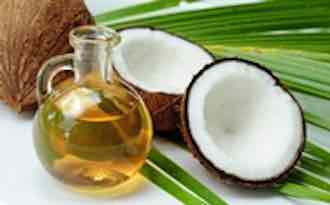By American Chemical Society ——Bio and Archives--June 8, 2017
Science-Technology | CFP Comments | Reader Friendly | Subscribe | Email Us
 End-of-life vehicles, with their plastic, metal and rubber components, are responsible for millions of tons of waste around the world each year. Now, one team reports in ACS Sustainable Chemistry & Engineering that the plastic components in these vehicles can be recycled with coconut oil and re-used as foams for the construction, packaging and automotive industries.
Recycled polycarbonate (PC) and polyurethane (PUR) are ideal for building insulation, refrigerators, cushions and packaging products. But it can be challenging for plastic car components to get to that point. Some plastic wastes from vehicles can be easily reprocessed; however, PC and PUR materials require a more arduous chemical recycling method. In addition, paints and coatings on PC and PUR plastics from cars typically interfere with the process, causing the recycled product to deteriorate. And simply adding some types of recycled PC and PUR materials to existing insulation foams, for example, can make the foams too dense or brittle. Although researchers have developed various chemical recycling techniques, very few have tried to make useable products with them. Hynek Beneš, Aleksander Prociak and colleagues wanted to take a new approach to converting PC and PUR into recycled materials, with the hopes of increasing their applications.
End-of-life vehicles, with their plastic, metal and rubber components, are responsible for millions of tons of waste around the world each year. Now, one team reports in ACS Sustainable Chemistry & Engineering that the plastic components in these vehicles can be recycled with coconut oil and re-used as foams for the construction, packaging and automotive industries.
Recycled polycarbonate (PC) and polyurethane (PUR) are ideal for building insulation, refrigerators, cushions and packaging products. But it can be challenging for plastic car components to get to that point. Some plastic wastes from vehicles can be easily reprocessed; however, PC and PUR materials require a more arduous chemical recycling method. In addition, paints and coatings on PC and PUR plastics from cars typically interfere with the process, causing the recycled product to deteriorate. And simply adding some types of recycled PC and PUR materials to existing insulation foams, for example, can make the foams too dense or brittle. Although researchers have developed various chemical recycling techniques, very few have tried to make useable products with them. Hynek Beneš, Aleksander Prociak and colleagues wanted to take a new approach to converting PC and PUR into recycled materials, with the hopes of increasing their applications.View Comments
American Chemical Society, ACS is a congressionally chartered independent membership organization which represents professionals at all degree levels and in all fields of chemistry and sciences that involve chemistry.